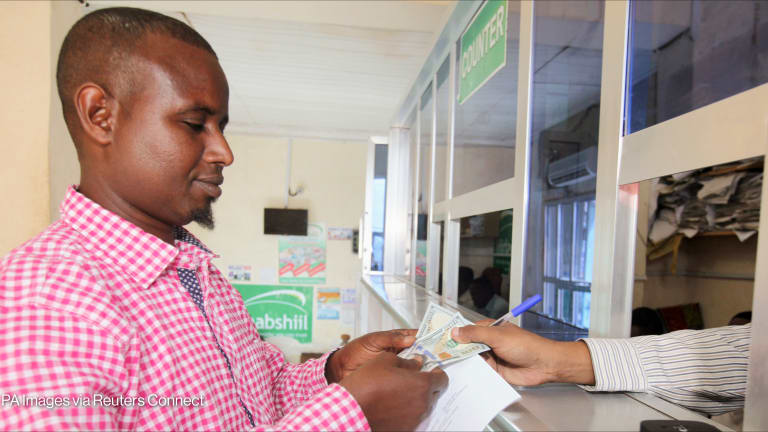
When we think of the African diaspora, we often imagine large networks across Europe or North America and the indelible contribution they play to national culture and society. But get in a taxi in Cape Town, South Africa, and there is a high chance your driver is from Malawi, Nigeria, or the Democratic Republic of the Congo.
While Europe, North America, and even the Middle East are often the first places we associate with African migration, more than 70% of sub-Saharan African migrants stay on the continent. Countries such as South Africa, Côte d'Ivoire, and Uganda are among the top destinations.
COVID-19 could tank remittances, accelerate digitization
The coronavirus pandemic is expected to cause a drastic decrease in remittances to Latin America and the Caribbean but could play a role in increasing digitization of money transfer and banking services in the region.
Africa's diaspora contributes at least $84 billion to the continent’s gross domestic product — significantly more than the $47 billion that Africa receives from foreign direct investment and the $50 billion it receives in aid. These funds play an important role in supporting everyday costs, ranging from food and school fees for siblings to health care for relatives and new homes for aging parents.
As COVID-19 grinds the global economy to a halt, many in Africa’s diaspora have seen their incomes slashed and their ability to send remittances home diminished. What’s more, those with money to send have little ability to get it there, as closed borders and curfews stop funds from moving too — by how much, nobody really knows at this stage. The World Bank reckons the decrease could be at least 23%.
We will not know what permanent scars COVID-19 will leave on the way we work, travel, and move for some time. However, it is clear that the world as we know it has changed and will continue to do so. And just as the coronavirus has pushed people to embrace technology to ensure we can still work, learn, and socialize, we must also better embrace technology to improve the way people can send money home.
Research from 2015 and 2016 showed that 90% of remittances from the U.K. to Africa were cash transactions via agents. While things are changing, many still rely on using cash to get money home. Until borders started to close and curfews came into effect, few people saw the need to change. Although counterintuitive — given the strength of mobile money in Africa — cash continues to be the only option for sending money to most remote places.
COVID-19 has exposed one of the biggest flaws in the system: an overreliance on cash at the expense of digital transactions. With focused investments and collaboration, we can ensure we build a stronger digitized system and potentially help people through this crisis.
Remittances fill a hole in many family budgets, often measured by whether a sibling can receive an education or a loved one can get health care.
—When the pandemic first started to emerge, several African governments and the private sector slashed transaction fees and used incentives to encourage the use of mobile money over cash. With over 100 million mobile money accounts on the continent, this was a response that could be enacted relatively fast and easily. Mobile money is generally more accessible and widespread than banks, ATMs, and money-transfer outlets.
However, unlike mobile money, mobile remittances aren’t as simple. While remittances can easily flow within countries — say, from Nairobi to Kisumu in Kenya or from Dakar to Kolda in Senegal — cross-border transactions, such as from Cameroon to Nigeria, remain difficult. And that’s mostly due to regulatory issues.
So, what can be done to help solve this? While there is a strong case — beyond remittances — for government investment in providing basic infrastructure, there are three areas that governments could prioritize to encourage the uptake of mobile remittances.
First, use public-private partnerships to drive investment in critical infrastructure such as network towers. Next, remove regulatory barriers and review taxes to encourage more competition and growth. For example, nonbank financial players, such as mobile money operators, struggle to access licenses for cross-border remittance services, while the distortionary taxation of digital transactions often voids any savings.
Finally, explore digital government-to-person payments and virtual currencies as ways to familiarize consumers with digital channels from a government perspective.
More can also be done by telecommunication companies and remittance service providers to ensure the delivery of services to the “last mile.” With mobile money, for example, many villages will often have one agent providing services for multiple platforms.
By collaborating and creating interoperability, we can increase the availability of access points where cash-out will be inevitable. If we can get remittance services to the last mile, we can reduce the miles that cash has to travel. There are also opportunities to explore ways that people can send remittances directly to schools, hospitals, or utility companies — typically the three key uses for remittances, apart from day-to-day household expenses.
Development partners such as FSD Africa are focused on strengthening financial markets and play a central role in delivering research, providing funding, and assisting in the development of suitable policy and industry changes.
The impact that COVID-19 is having on remittances goes beyond numbers and percentages. Remittances fill a hole in many family budgets, often measured by whether a sibling can receive an education or a loved one can get health care.
As we’ve seen across the world, the coronavirus has impacted economic and social policy in ways that we could have never imagined. While we can’t correct some of the weaknesses that this pandemic has exposed in global remittances, we can work together to drive change and make the system more resilient for when the next shock hits.
Visit our dedicated COVID-19 page for news, job opportunities, and funding insights.










